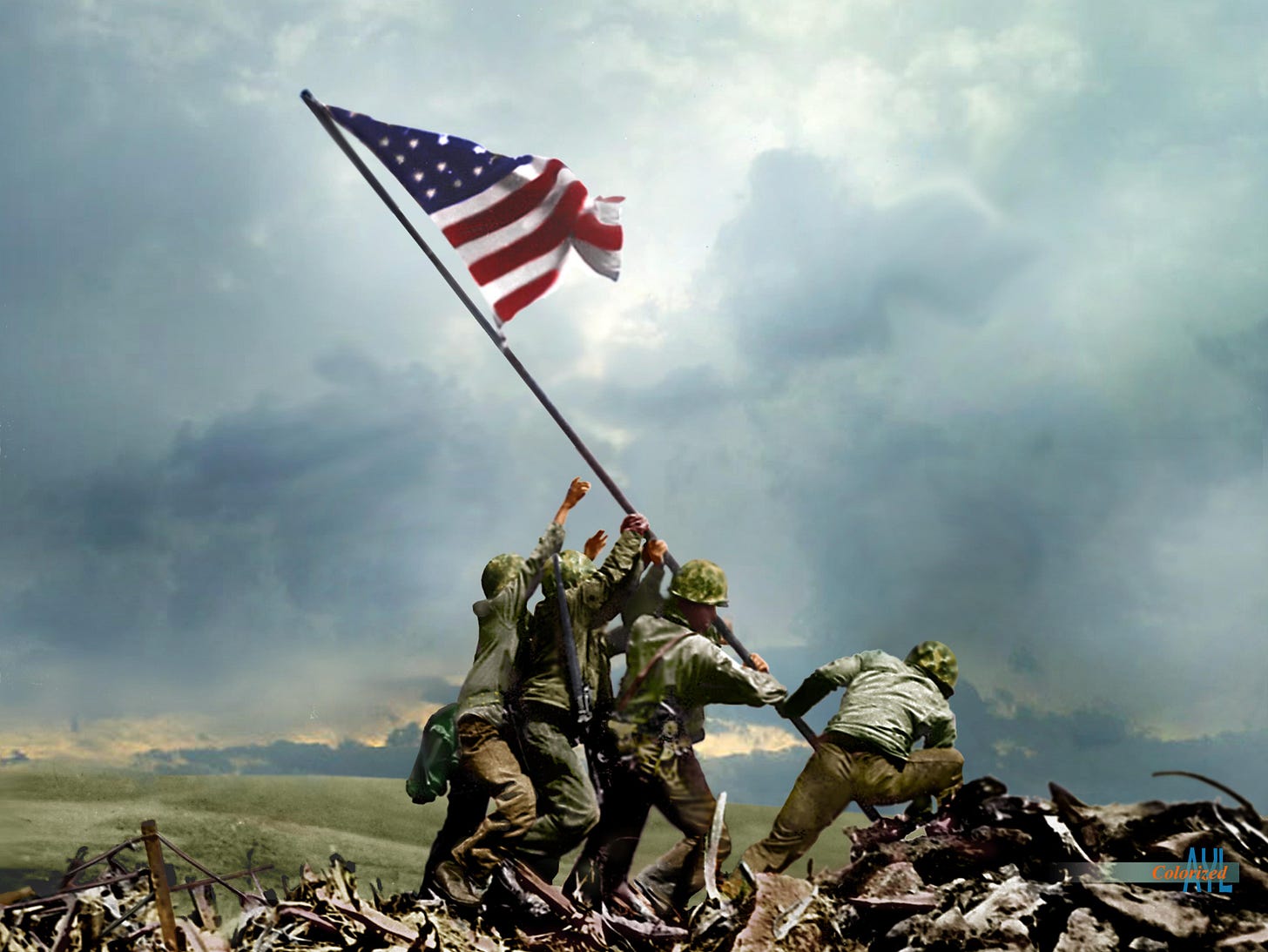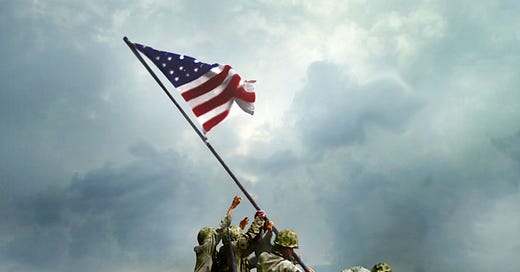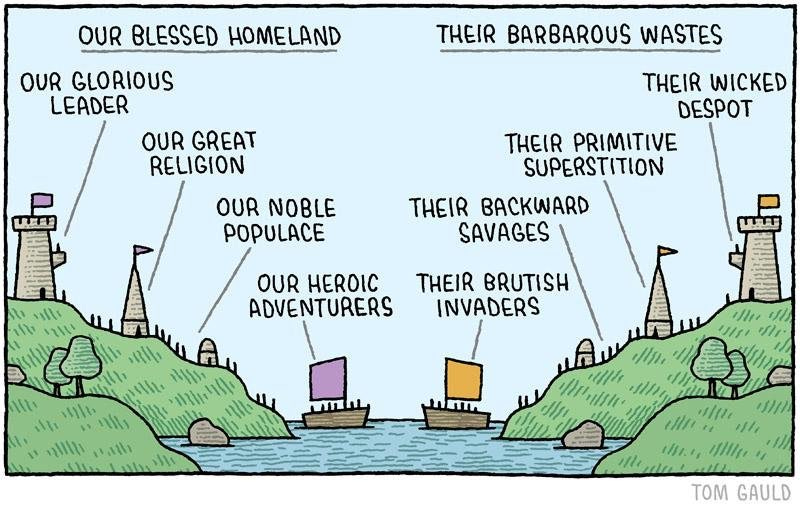1 | THE ADEPT'S GAMBIT : A History of the Purpose of War
Method & Madness | Book III : The Masters' Game

It is clear why in the colonial countries the peasants are revolutionary, for they have everything to gain and nothing to lose. The starving peasant is the first among the exploited to discover that only violence pays. For him there is no compromise, no possible coming to terms; it is only just a question of relative Power.
—F. Nietzsche (ab. M. Hise)
In our world—in reality—human beings need these things:
Water: to drink
Food: to eat
Shelter: to fend off the elements
These are Resources—and, all creatures know their necessity: that one must always acquire more Resources in order to benefit one’s Survival & Prosperity.
All Resources come from Territory: the physical space of the earth itself. This is land, on which water rains down and collects into streams, ponds, rivers, and seas. Where water is, can food grow—and where there is Territory are there materials from which to make shelter.1
War isn’t fought for the sake of morality2—on account of Good & Evil. Instead, it’s fought in the name of Survival3; for the sake of the Good & Bad.4 The goal of the Masters who play the Game is not to slay Evil, but repel what’s Bad—
To collect Resources and defend Territory in order to create a Good situation.
Thus, they endeavor to build high walls—a fortress and Eden provisioned with all the things they’d need to weather the storm; to ensure the Survival & Prosperity of everything they love.
This is the board upon which we play the Masters’ Game: the land of the earth itself. The Territories which mankind has carved upon the face of our world.
A Game of Survival—of life and death.
Hegel refers to our Game as the Master-Slave Dialectic: the eternal struggle for Dominance which is waged between rivals. The victor becomes the Master—free and Empowered to shape the world according to his designs—and the loser becomes the Slave; his Agency lost and himself forced to submit to the Master’s will… or else.
This, we call the Civil & Rival:5
The in-group & out-group. The self and the Other.
The us-versus-them.

War is fought for the sake of Survival—and, therefore, of Resources and Territory.
The goal of the Pragmatist who helms a tribe is thus to control—to Civilize6—Territory.
To gain control of a piece of Territory, one must first become its occupant. Land, after all, doesn’t simply just become controlled through contractual exchange. Land is only controlled—in reality—via occupation.7 And so, in order to Civilize Territory, one must first Civilize its occupants—its people. One must become Master, winning either their allegiance or compliance… by whatever means necessary.
This is the origin and purpose of war:
Control via Civilization of Territory: a Dominion over people.8
In the Masters’ Game, there are two ways to win—to achieve Dominion, and better-ensure the Survival of one’s own people. This strategic fork is the Adept’s Gambit—a necessary choice to be made between:
Assimilation: a merger & acquisition, wherein the Master attempts to Civilize a Rival tribe, eliminating any independent identity in order to integrate them as Civil9.
Annihilation: a hostile takeover, wherein the Master Rivalizes a Rival tribe, attempting to expel or eradicate them in order to replace them with Civil people instead.
The choice is simple: join or die.
In a perfect world of rational Order, Assimilation would be the only Gambit played in the Masters’ Game. It is—at least, in theory—the more economical and logistically-sound Method of achieving Dominion. To attempt Annihilation means, after all, that—first-and-foremost—one must wage war.
And war is, at a fundamental level:
The ultimate exercise in waste—of expending Resources attempting to deplete and destroy other Resources.10
And so, if the goal of the Masters’ Game is—in the first place—to collect Resources… then the strategy of Annihilation makes no sense.
Assimilation is Civilization.
Annihilation is Rivalization.
Thus is Assimilation an attempt to convince Rival tribes to become Civil—to come peacefully under the Master’s wing and merge into one culture; his people. In this way would he be able to effectively achieve Dominion—and that, without having to destroy any Resources… or eradicate any people.11
In reality, however, the world is not a place of basal, rational Order… but instead of a primal, unpredictable Chaos. Thus does Assimilation suffer from one tragic, fatal flaw—that is, that:
Assimilation is always slow… while Annihilation can be fast.
This is the crux of the Adept’s Gambit: a choice which must be made between maximal efficiency and necessary security.
Assimilation is, after all, a strategy which could take years, or decades—even generations to complete. And so, though it may seem—logically speaking—that war might be entirely unnecessary… it may most often be the case that war is actually inevitable. In the end, the Master has only one lifetime—only so much Power and time by which to push the world toward his vision. Thus-faced with the fact of his own mortality, can he really afford to wait generations? To entrust the guarantee of the Survival of his people to the compliance of Rivals and competence of successors?
Assimilation is the Idealist’s path: a hope and a dream for a kinder world—a gentler and more-Righteous future. The Pragmatist knows and understands, though, that the world is Chaos and Order is made—that hope is not action, and that the road toward an Ordered, Utopic dream is paved with the blood and Labor of men.
Thus is it the case that—though war may never be ideal—the Adept knows that there comes a time when he must make his Gambit. When, in reality, reason falls upon deaf ears and the time for talk is at its end, he knows he must steel his heart for war—that is, if he values the Survival of his people. After all:
War is the final stage of diplomacy—the method by which new understanding is reached when compromise cannot be made.12
In the world of primal, unpredictable Chaos, Annihilation is a Gambit played because it can be fast—and thus, holds the potential to greatly reduce margin-of-error. A single Master can see his conquest through to completion within one lifetime—and thus, through genocide, can he ensure that a Territory is cleared of Rival Agents. The murder of the Rival leaves a vacuum in its wake—one then occupied by the Civil instead; a loyal people who will work to expand the Master’s Dominion.
Potential, however, is not certainty; and thus, the Master who actions Annihilation must also accept a risk proportional to the gravity of his choice—that is:
The possibility that he does not win, and may lose his own war of Annihilation instead.
The Rival, after all, is a Rival Master—his people, their own Rival people—who will not go easily and will not die willingly. They will rise instead in defense of their Territory—for the sake of the Survival of what’s Civil… to them.
Thus, is the die cast:
A wager made between Civil and Rival that each will play a superior Game.
A Master who wages an efficient war may find swift and early victory. If Civil and Rival are well-matched, however, they may find themselves dragged down into a grinding contest of perpetual waste. If the Master loses, he and his people face risk of Annihilation. Yet still, if he wins—but fails to push his war to completion13—then he may soon find that a people he’s attempted by force to Civilize may re-Rivalize and metastasize in domestic rebellion, forcing him to waste even more Resources.
In the end is Annihilation an attempt to achieve Dominion through genocide—that is, by eliminating Rival tribes to ensure that the Civil alone will Survive.

The purpose of war is to establish Dominion.
Dominion must be established in order to control Territory.
Territory must be controlled in order to secure Resources.
Resources must be secured in order to ensure Survival.
This is the nature of the Adept’s Gambit. All else follows from here.
The question of Civil & Rival is this:
Who is it that counts as Man, when we say:
“Man is born and remains free-and-equal…”Who is it that counts as People, when we say:
“We the People…?”
The ocean is, quite obviously, also Territory—just with a different pattern of Resource distribution, and therefore a different set of rules by which one must play.
As in Nietzsche (and history), wherein the inverse is true: i.e. Moralism is a means of waging war. Not an end in itself, but instead a weapon used to drive men to die for another’s cause.
Prosperity is an extension of Survival, as the natural consequence of successfully generating abundant Resources implies access to an abundance of Resources.
Book III, Section 3: The Charlatan’s Gambit.
Book II, Section 9: The Dialectical Cube.
That is, to make-Civil; to un-Rivalize. To establish as belonging-to or to absorb-into an in-group.
Contractual exchange can only confer a legal (i.e. social and/or theoretical) right to occupy a given Territory. It has no bearing on who actually (i.e. empirically) occupies that Territory.
To the Adept, there is nothing of greater importance—thus, in the end, any gambit which he plays upon the board will be made with Civilization and Domination in mind.
i.e. a Slave, in Hegelian terms.
War is a Game of strategic logistics—first of logistics, then of strategy. It’s good logistics, after all—the effective movement and allocation of Resources—which enables good strategy. To enact good strategy is, furthermore, to find a way to most-effectively expend Resources to achieve a goal. Thus is war ultimately an exercise of expending Civil Resources attempting to waste Rival Resources… so that the victor may, in the end, simply secure more Resources.
Examples of Assimilation tactics include: subsidized public education, religious ministry, cultural genocide, and compulsory indoctrination. While it’s obvious that there can also be mutual-Assimilation (i.e. culture-of-tolerance, or multiculturalism), mutual-Assimilation remains Assimilation, and thus suffers the same strategic drawbacks and disadvantages. All Assimilation—mutual or not—involves short-term risk of rejection, and the possibility of swift and brutal mutual re-Rivalizations. This obviously doesn’t mean that mutual-Assimilation can’t produce good outcomes—only that it is strategically nuanced and complex, and is not and has never been risk-free.
Combat is itself a conversation—to this, any seasoned fighter can attest. Thus is war itself a form of negotiation-by-Power—by force-of-will.
i.e. if he fails (whether by simple incompetence or misguided compassion) to kill them all.














